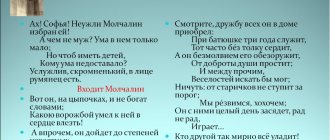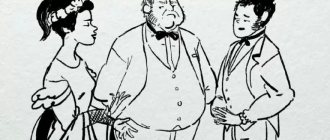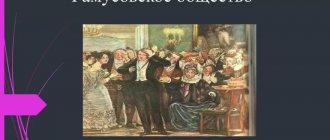A. S. Griboyedov decided to write his satirical work “Woe from Wit” for various reasons, and various people from his own society became stereotypes of the heroes he invented. So, as for the main character Chatsky, some argued that this character very much resembled Griboyedov’s friend, Pyotr Chaadaev, who sharply criticized the government system and who was also once declared crazy due to differences in views with society. But there is an opinion that this hero became the prototype of the author himself, on whom the shadow of madness also fell, and also due to the fact that he went against the opinion of established views in society, which is why he was sent to serve in East Asia. Now, with great interest, I would like to understand the topic “Quoted Characteristics of Chatsky” and find out what kind of person he was, whom society accepted as insane. Maybe there is some truth in this...
Quoted description of Chatsky. The Hero Appears
All brilliant people are a little crazy, because they often look at seemingly the most common things and circumstances differently. Both Pushkin and Lermontov with their freedom-loving poetry, which denounced modern morals and rulers, were probably attributed to such crazy people.
As for our topic “Quote characterization of Chatsky” (“Woe from Wit”, Act 1), we can begin to reveal it with the explanation that Chatsky is a nobleman who returns to Moscow from abroad to quickly meet Sofia Famusova . He hadn't seen her for almost three years. They were friends in childhood, then their relationship grew into love, but Chatsky unexpectedly left without even warning Sophia about it. And in the first act, he appears in the Famusovs’ house and hurries to see Sophia, but she greets him very coldly, since she has not forgiven him and is now very much infatuated with Molchalin.
Conflict between fathers and sons
Quotes that Russian people remember are related to the theme of fathers and sons. They reveal the characters well.
Chatsky, observing his contemporary society, does not support Famusov’s followers, believing that in the generation of fathers there are no role models: “Where, tell us, are the fathers of the fatherland, Whom we should take as models?” The main character o. Chatsky pronounces his famous monologue, which begins with the well-known line “Who are the judges?” This monologue is again dedicated to the conflict between fathers and children.
When Chatsky finds out that he was mistaken for a madman, he utters the following phrase: “And here is public opinion!
" This quote confirms the idea that Chatsky is fenced off from society.
This article, which will help you write the essay “Quotes from the heroes of “Woe from Wit”,” will consider quotes dedicated to revealing the themes of service, love and education, as well as dedicated to the main conflict of the work – the conflict between fathers and children.
Molchalin - antipode
Griboyedov loves to contrast heroes, and, of course, the complete opposite of Chatsky, especially if you compare them by character, worldview and position in society, is Molchalin. He is a typical representative of the Famus era, which is gradually becoming obsolete. In his work, Molchalin’s interactions with people are meekness and education, but he is the personification of selfishness, veneration and flattery. This hero is a faceless quiet person, about whom it is customary to say that he can reach the famous levels, “after all, nowadays they love the dumb.” He is ready to curry favor and bow to anyone, if only for the sake of his selfish goals. Career and obtaining a high rank are above all else for him. He has no concepts of honor and pride. He is always ready to adapt to the powers that be, and even himself notes that already at his age “one should not dare to have one’s own judgment.”
Molchalin is a two-faced young man, he deceives Sophia and, when no one is looking, pursues the maid Liza. However, Griboedov still diluted his numerous vices with moderation and accuracy.
Chatsky: what you need to know about the main character of “Woe from Wit”
The famous play by Alexander Griboyedov
, completed by him in 1825, was disassembled into quotations long before publication in the official press.
Despite censorship bans on the publication and theatrical performances of “ Woe from Wit
,” handwritten copies spread with lightning speed among the reading residents of Moscow and St. Petersburg. The unusual hero aroused anger among some and delight among other inhabitants of the “high society”, and his sharpness and directness surprised no less than the innovative techniques of the author-playwright.
There were already literary disputes about what Chatsky really was. This character has not been forgotten even now, almost 200 years after his “birth”. Why is the image of Chatsky so attractive to readers from different eras?
-8% Woe from Wit Alexander Griboedov Hardcover249 RUR274 RUR Add to cart Add to cart
Chatsky and the Famusov society
Griboyedov himself once called Chatsky the only sane person “out of 25 fools,” that is, the rest of the characters in the play. At the same time, Alexander Andreevich became one of the first Russian literary heroes who dared to openly oppose themselves to society.
The guardian of an early orphaned young man, Pavel Afanasyevich Famusov, spared no expense in giving him a European education, but his ward did not accept the views of the older generation. Three years of travel also affected the worldview of the attentive Chatsky. Having matured, he only saw more clearly the mistakes in governing his native country and the gaps in the intellectual and cultural development of representatives of Moscow society. Mothers and fathers, concerned only with how to quickly and profitably “place” their daughter-brides; young fashionable coquettes and young middle-aged ladies, full of mutual envy and affectation; military men receiving ever new ranks and orders for patiently waiting for the demotion or death of others; the hypocritical helpfulness of young officials and the militant ignorance of old landowners - all this terribly irritates Chatsky, and he openly declares how disgusted he is with both the condemnation and praise of these people. The hero denounces swindlers, flatterers and ignoramuses, defending those who strive to master knowledge and art.
Chatsky and Molchalin
Sophia’s new “heart friend” Alexey Molchalin turns out to be the complete opposite of Chatsky. The sincere, impetuous and mocking hero, who is “sick of being served”, at first even refuses to recognize the “silent”, helpful and cold careerist as an opponent. But on the other hand, he clearly sees what is hidden from the eyes of Sophia herself: this “most pitiful creature” who receives ranks and universal favor for the ability to flatter at the right time, “moderation and accuracy” cannot be a worthy match for such a girl. Famusov's daughter, blinded by her feelings for Molchalin and offended by Chatsky for his long absence, mistakes the flattery, resourcefulness and spinelessness of Alexei Stepanovich for kindness, altruism and modesty. She, unlike Chatsky, does not understand that “silent people are blissful in the world” only thanks to their hypocrisy, and there is nothing to think about virtue and hard work here.
Chatsky and Sophia
The sincere feeling of the main character became no less a problem for him than the conflict with society. Admitting that his “mind and heart were not in harmony,” he behaved inconsistently with his beloved, at the same time harshly criticizing all her loved ones and being surprised at the reciprocal coldness towards him. Chatsky and Sophia grew up together, and this meant a lot to them. But having left his native land for three whole years of his own free will, Alexander Andreevich for some reason did not consider it necessary to write to the girl at least once, naively believing that a long separation would not harm their relationship in any way.
Read also: Not romance, but a clinic
As expected, the girl grew up, attributed all the joys of the past to “childhood friendship” and found a new admirer. But Chatsky’s eternal ridicule and slander still hurts and upsets her. At first she tries to prick her former lover: “Has it ever happened that you laughed? or sad? / A mistake? did they say good things about anyone? / At least not now, but in childhood, perhaps.” But then he becomes completely disappointed in him and suddenly decides to take revenge for the insult by spreading a rumor about Chatsky’s madness. He remains true to himself - and in the most cruel way opens Sophia’s eyes to the true essence of Molchalin. The destinies of the young people completely diverge: the society Chatsky hates absorbs Sophia, and he himself moves away from it.
Winner or loser?
Having changed the canons of classicism in his play, Griboyedov endowed Chatsky with the features of a realistic and romantic hero. This is partly why in the finale the character is forced to leave high society and leave Moscow, having lost both his former love and the remnants of the affection of those around him. But the question of who Chatsky ultimately remains - a winner or a loser - is not as simple as it seems at first glance.
On the one hand, in the finale of “Woe from Wit,” something completely uncharacteristic of comedies of that time happens: vice remains unpunished, and the only positive hero ceases to prove that he is right. On the other hand, the “Famus” society never manages to “break” Chatsky, and he remains himself: well-read, honest, truthful, wishing the good of others not in words, but in deeds. The hero turned out to be so lively and believable that critics' opinions on him were divided. While Alexander Pushkin
and Mikhail Dmitriev, openly sympathizing with Chatsky, still denied him intelligence,
Ivan Goncharov
considered him a rightful winner, who dealt a “death blow” to the old order and paved the way for positive changes for others.
New Generation
The quotation description of Chatsky is very different from the characterization of Molchalin. Chatsky is a representative of a new emerging society and, on the contrary, a very open and confident young man. He is a real patriot, but he left the service because he did not see any use in it. Chatsky does not find any benefit for the state and the people in the service, but if he only wanted, he could make a good career, “he is a smart guy,” “and writes and translates well,” that is, he knows languages. As you can see, the quotation description of Chatsky and Molchalin speaks for itself.
Chatsky is a Decembrist man; he believes that Russia is on the threshold of dawn, where there will be no unhappy and oppressed people, and he sharply condemns serfdom. He is confident that society will wake up sooner or later. And as for service, he makes the remark that he is ready to serve the state, and not individuals. Or his other famous phrase: “I would be glad to serve,” but, as they say later, “being served is sickening.”
Quotes about Chatsky
The full name of the hero is Alexander Andreevich Chatsky:
“...Alexander Andreevich Chatsky...”
Alexander Chatsky - nobleman, landowner with 300-400 serfs:
“- had three hundred souls. - Four hundred, please understand...”
Chatsky is a single man. He is still young, but no longer “falls into childishness”:
“...Yes, I’m not married...” “...Now I can’t fall into this childish behavior...”
Chatsky is a lonely man. His mother and father died when he was a child. Chatsky’s father was a friend of Famusov:
“...Here you go – Chatsky, my friend, / Andrei Ilyich’s late son...”
“...Chatsky, my friend, / Andrei Ilyich...”
After the death of his parents, Chatsky was brought up in Famusov's house. Having matured, he began to live separately:
“...Yes, with Chatsky, it’s true, we were brought up and grew up; / The habit of being together every day inseparably / Tied us with childhood friendship...”
“...but then / He moved out, he seemed bored with us, / And rarely visited our house...”
Chatsky has been friends with Sofia Famusova since childhood and has loved her for a long time:
“...I remember you often danced with him as a child...”
“...And yet I love you madly...”
At the beginning of the play, Chatsky returns to Moscow after 3 years of “wandering around the world”:
“...I haven’t written two words for three years! / And suddenly it burst out as if from the clouds...”
“...Scoured the light...”
“...The desire to wander attacked him...”
Chatsky is a member of the English Club, which consists of rich, noble nobles:
“...Then, think, a member of the English Club...”
Alexander Chatsky is a smart, witty man:
“...Oster, smart, eloquent...”
“...he’s a smart guy / And he writes and translates nicely. // You can’t help but regret that with such a mind...”
Chatsky is an eloquent person:
“...smart, eloquent...”
“...What does he say! and speaks as he writes!..”
Alexander Chatsky likes to make jokes and “tease” people, but he does not do this with the intention of harming:
“...and cheerful and sharp...”
“...Listen, are my words really all caustic words? / And tend to harm someone?..”
“...Not a man, a snake!..” (Sofia about Chatsky)
Chatsky is a mocking person, but his ridicule is always directed against stupid and narrow-minded people:
“...He knows how to make everyone laugh nicely; / Chatting, joking..."
“...Look at you for laughs, Chatsky will make you laugh...”
“...It’s noticeable that you are ready to pour out bile on everyone...”
“...A hail of your barbs and jokes will break out. / Tell jokes! and joke forever! How will you react to this!..”
“...Ah, Chatsky! You love to dress everyone up as jesters...”
Chatsky often talks to others in a harsh tone:
"…Yes! a menacing look, and a harsh tone, / And there are an abyss of these features in you...”
According to Sophia, Chatsky is intemperate in his tongue and too openly despises people:
“Why should there be, I’ll tell you straight,
So I will not control my tongue?
In contempt for people so openly?
Chatsky is a proud man, “proud,” according to Famusov:
“That’s it, you are all proud!..”
Alexander Chatsky is a free-thinking person, for which Famusov calls him a “Carbonari” and a “Jacobin”:
"…Oh! My God! he is a Carbonari*!..” (*that is, a revolutionary)
"…A dangerous person!.."
“...I think he’s just a Jacobin*...” (*that is, a freethinker)
Chatsky is an independent person. He does not want to depend on others, such as Molchalin:
Molchalin: After all, you have to depend on others.
Chatsky: Why is it necessary?..
Chatsky quit military service and also decided not to serve as an official. Among the nobles, it was customary to choose one of these two employment options, but Chatsky does not engage in either one or the other:
Princess. Retired?
Natalya Dmitrievna. Yes, I was traveling and recently returned.
According to Chatsky, nobles should not limit themselves only to bureaucratic or military service. He believes that an intelligent person can also find himself in creativity or science:
“Of the young people, there will be an enemy of quest, // Without demanding either a place or promotion to rank, // He will focus his mind on science, hungry for knowledge; // Or God himself will arouse the heat in his soul // To the creative, lofty and beautiful arts...”
Chatsky is a sincere person, not a pretender:
“…Once in my life I’ll pretend…”
Alexander Chatsky loves the truth:
“...Why should I deceive myself?..”
“...Why didn’t they tell me directly...”
Chatsky is a sensitive person:
“...Who is so sensitive, and cheerful, and sharp, / Like Alexander Andreich Chatsky!..”
Alexander Chatsky is a passionate, ardent person:
“...that passion? that feeling? that ardor?..
“...But what is boiling inside me now, worries me, infuriates me, / I wouldn’t wish it on my personal enemy...”
Chatsky has his own opinion about everything:
“...Why are other people’s opinions only sacred?..”
Alexander Chatsky is a patriot. He loves the Russian people and Russia:
“...So that our smart, cheerful people...”
In high society, Chatsky is considered crazy because of his freethinking and liberal views:
“...You glorified me as crazy with the whole choir...”
Chatsky does not like the “human crowd” and the Moscow Famus society. At the end of the play he leaves Moscow:
“...And in the crowd I am lost, not myself. / No! I am dissatisfied with Moscow..."
“...Get out of Moscow! I don't go here anymore. / I’m running, I won’t look back, I’ll go searching around the world...”
Quoted description of Chatsky (“Woe from Wit”) - the philosophy of a new way of life
It’s a pity, but people like Chatsky have almost no friends, he is lonely, even the person he loved has become indifferent to him. His communication with others is based on conversations and monologues that cause disputes and conflicts, and they are addressed primarily not to the opponent, but to society as a whole.
Griboyedov specifically contrasts these two heroes in order to more clearly reveal their essence and character. He presents them as two philosophies and two sciences of life of the present and past centuries, but he sympathizes and fully approves of the views and judgments of Chatsky, an intelligent, educated and honest man.




